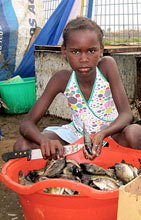Angolamany children continue to suffer from problems associated with malnutrition, lack of water, health, or protection

In Angolamany children continue to suffer from problems associated with malnutrition, lack of water, health, or protection. Malnutrition, a direct consequence of poverty, is a serious and troubling problem in Angola. Families can’t give their body as much food as it needs. Children, with weaker bodies and health, are more vulnerable and suffer seriously from hunger. Malnutrition is one of the main causes of child death in this country.
Therefore, this project is for those marginalized group who lack access to safe and healthy food, health care, digital technologies and knowledge, skills and competencies required to navigate them.
With regard to the availability of food to families; we promote the increase and diversification of family production, and the improvement of post-harvest conservation systems. We also will conduct community education on appropriate feeding practices, hygiene, and sanitation. During nutrition screening we will also conduct online-offline cooking demonstrations to show households how they can prepare a healthy meal with locally available ingredients.
Please click here to find other activities to be implemented:https://tff-zero-hunger-angola.blogspot.com/2021/05/bridging-digital-divide-solutions.html?m=1&zx=d877b6498f014cbe
Our dream is to build a big school-center in a rural area allowing the access to up-to-date curriculum education programmes and trusted e-learning resources, among many other benefits such as video and social media.
The center will be equipped with ICT tools and internet. In the near future a store with affordable prices containing ICT tools and 5G technology will be built, so that poor people can access and buy technology.
Benefits 1
We want all children in Angola to enjoy good health. We working towards this by:
Street children will be screened for malnutrition, vulnerable mothers and caregivers will learn about the proper feeding practices
Benefits 3
Social inclusion for older people
This project aims to create a social inclusion policy to incorporate core issues in ageing such as civil engagement, an ageing workforce, age-friendly communities, and Civic involvement.
1. We will reinforce family farming for the lifetime benefit of the elderly, poor women, disabled and orphaned children.
The project will contribute to the sustainable and inclusive transformation of family farming, with the aim of increasing incomes, improving food and nutrition security, contributing to the diversification of the economy and job creation in rural areas.
2. Educational attainment, digital literacy and employement among rural communities
Implementation of online-blended platform for vulnerable and illiterate women and girls including farmers and disabled children in rural and urban areas.
3. Food Distribution Programme for the Most Deprived Persons in rural and urban areas.

Comments
Post a Comment